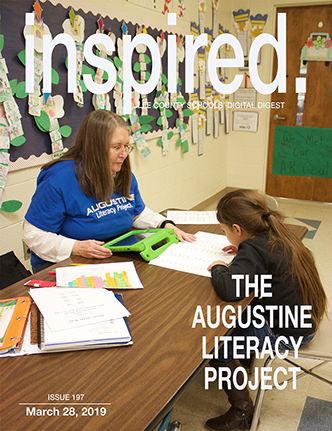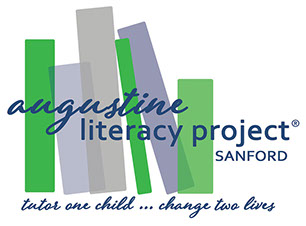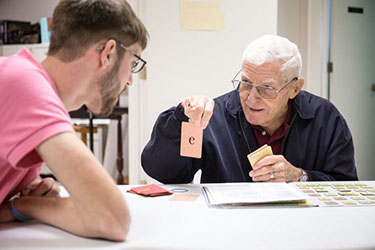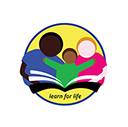Lee County Literacy Council Inc
312 N. Steele Street, Sanford, NC 27330
Phone: (919) 708-2178
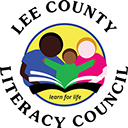
Learning Resources & News
How do we support our volunteer tutors?
Lee County Literacy Council provides essential learning tools to help serve all literacy needs to tutors and volunteers and students.
Our learning resource center is located at St Thomas Episcopal Church, 312 N. Steele Street, Sanford NC 27332 (click address for map)
We are here to support volunteers including: help with researching information for specific needs of the student, learning planning ideas, lesson plans and readers for adults and children to use.
LUNCH BUNCH
Lee County Literacy Council hosts a Lunch Bunch, a fun gathering of tutors, volunteers and support staff to pull together discussing resource planning and preparation. Keeping updated on the latest news and teaching instruction in the programs across Lee County Literacy Council. Receive continuous support throughout the year on different research educational topics, subjects and speak with other people about the needs of our community.
What is Literacy?
Literacy is the ability to read, write, design, speak, and listen in such a way that allows you to communicate effectively in today's modern world. The power of literacy lies just not in the ability to read and write, but rather in a person's capacity to apply these skills to effectively connect, interpret, and discern the intricacies of the world in which they live and function.
The better you are able to read and write the more literate you become. This starts by learning the language, the vocabulary and how to use the words to communicate. People talk with others, they read information and they use this knowledge in their daily activities. People who are highly literate can communicate abstract ideas and understand what they read from simple to complex sources. The goal of all free people is to become highly literate. Proficiency in reading and writing is a life time activity. Like any activity it starts with the basics and you build on it until you become good at it. People do not just start playing the piano or become experts in sports, they train and practice. Becoming literate is the same thing, learning, practice and continued learning and practice. (Flesch-Kincaid Grade Level 7.1)
Learn to read and read to learn. The more you learn the more literate you will become.
(Flesch-Kincaid Grade Level 2.1)
lee county literacy council inc
Serving Adults and Children
NEWS
Keep up to date on the latest news and Information to all students and tutors. Learn about what is the happening in the community and all programs involved with Lee County Literacy Council.
IN THE NEWS:
Click here to read this week's edition of our award-winning digital digest - INSPIRED.
by Lee County Schools
Inspired is a digital digest published each week during the academic year by Lee County Schools to highlight accomplishments of students, faculty and staff.
All Inspired articles are available online at www.lee.k12.nc.us, and if you have any story ideas, please send them to inspired@lee.k12.nc.us.
INSPIRED. The Augustine Literacy Project
For Barbara Yuskevich, literacy is a passion.
Yuskevich is the founder of the all-volunteer Lee County Literacy Council, which makes its primary goal to “improve the reading, writing, spelling and comprehension of children and adults” through “research-based literacy instruction in a nurturing environment.”
And nowhere is that goal – and Yuskevich's passion for literacy – more evident than at B.T. Bullock Elementary School in Sanford, where the Literacy Council's Augustine Literacy Project is at work to help first and second graders improve their reading skills to at or even above grade level.
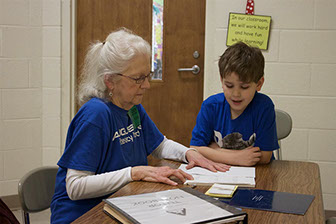 An Augustine tutor helps a student with his reading.
An Augustine tutor helps a student with his reading.
“The Augustine Project came from Chapel Hill, where there was a parent who couldn't get her child properly educated because she was dyslexic,” Yuskevich said. “So she began a tutoring project in Chapel Hill that eventually became what we're doing now.”
Through the Augustine Literacy Project, 15 tutors – each of whom has 30 hours of training before ever setting foot in a classroom – work one-on-one with first and second graders at Bullock who have been identified through state-mandated mClass assessments as being below reading level for their grade. Because first graders are expected to grow a whopping six reading levels through the course of the year, the program provides an often-necessary service to many, and the research-based, phonetic-structured program has been proven to work.
An Augustine tutor helps a student with his reading. 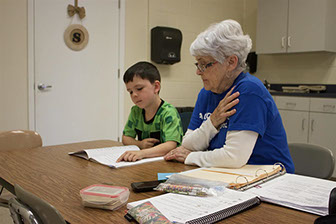
“We do a lot of syllable work, teaching them how to break words down into syllables and then put them back together,” Yuskevich explained. “One key thing is we have the children tap the sounds out with their fingers, and then say the whole word, so they're acting out something physical while they're doing the spelling.”
Bullock Principal Stefanie Clarke said the Augustine Literacy Project, under which the students receive the tutoring twice each week, is important for many reasons, but one of the biggest ones is that it doesn't require any additional work for the classroom teachers.
“It's such a luxury for the teachers to have,” she said. “Barbara and her tutors do all the hard work – I just open the doors and ask them to come in. Her team is just the sweetest, kindest group of people. They're all sort of grandparent age, and I think there's something really sweet and special about that connection.”
An Augustine tutor times how long it takes a student to read specific words. 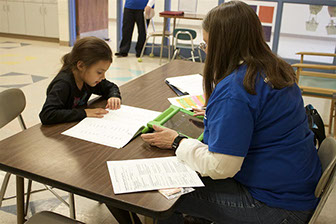
Because each child starts at a different point, the tutoring is highly customized, always positive – there's no red ink, for example, which emphasizes confidence building and allowing children to make mistakes – and re-assessments are frequent.
“It's a constant litmus of how the students are growing and progressing,” Clarke said.
As such, it's not uncommon to see students begin the program far below grade level in reading skills and advance quickly – sometimes going up as many as four or five levels in a matter of months.
“We've seen some really incredible changes,” Yuskevich said. “And it happens again and again and again. The staff here has been phenomenal, and (Clarke) really has a heart for the kids.”
Yuskevich said the program is always looking for volunteer tutors, and those interested in becoming a part of the program can visit the Lee County Literacy Council’s website at www.LeeCountyLiteracyNC.org or call 919-708-2178.
____________________________________________________________________________________________________________________________
Training Dates for the Augustine Literacy Project® Sanford
We are offering training for the Augustine Literacy Project® Sanford please contact our office for details St. Thomas Episcopal Church located at 312 N. Steele Street, Sanford, NC 27330. With interest call 919-708-2178 or email children@leecountyliteracync.org.
Our mission is to improve the reading, writing and spelling abilities of low-income children and teens who struggle with literacy skills. We provide ongoing, hands-on, and accessible tutoring for our students and the resources and training needed for its volunteers.
We train and support volunteer tutors who provide free, long term, one-to-one instruction using the Orton-Gillingham approach and Wilson Reading System® materials. Our tutors work with students in the Sanford area.
Serving school age children who qualify
• Low-income receiving free or reduced lunches at school
• 1-2 years behind in reading, writing or spelling
• Receiving other Social Service such as Medicaid, WIC, or housing
____________________________________________________________________________________________________________________________
